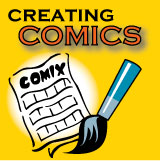 Have you ever read a comic and pored over the beautiful drawings, or wondered why those colored dots disappeared, or how many people it took to write, draw, print, publish and send out the comic? Have you ever thought of making your own comic?
Have you ever read a comic and pored over the beautiful drawings, or wondered why those colored dots disappeared, or how many people it took to write, draw, print, publish and send out the comic? Have you ever thought of making your own comic?

Maybe you have an idea for a comic, but don’t know how to write; or maybe you can write, but don’t draw as well as you’d like to. How do you take an idea to the next level? How do you turn a sketch into a finished comic? And how do you get that finished comic into the hands of a publisher?

Trillions of comics have been made by people in all walks of life, across all times in history and all in kinds of circumstances. With so many people making them there must be a method to the madness.
Over the last several years, I’ve actively pursued making comics as a profession, and have gobbled up every bit of information and advice on making comics that I could beg, steal or borrow. I’ve researched publishers, writing techniques, printing processes, materials, drawing methods and everything else available on the internet, at school, in books, videos, interviews, reviews and via emailing authors and artists.
There’s a lot of information out there, but little of it acts as a direct education in how to make comics. Tim has been kind enough to allow me this space to share what I’m learning about the processes and working methods in creating comics—something I’m very passionate about and am eager to share.

So, let’s dig in. First things first: we can’t talk about making comics without bringing up Scott McCloud and his incredibly informative series of books on the comics medium and storytelling techniques. His Making Comics will be required reading for this column.
Choosing the right moments to make into panels, framing actions, guiding the reader’s eye, choosing words and images that communicate together, mastering body language and facial expressions, creating rich, believable worlds…it’s all there in black and white, and is one of the few comics available in most libraries across the planet.
Scott McCloud himself is a powerfully helpful resource in the comics world and it’s worth checking out his blog to see what he’s reading, learning and working on.
While we won’t be following Scott’s book chapter by chapter, we will be referring to his book and writing about many of the same topics and issues covered in Making Comics.

Do you have an idea for a comic that you’d like to make? Is there a character or story that’s been floating around in your head that you’d like to see realized?
CHALLENGE: I’d like to challenge you to come up with something. If you could make your own comic, what would it be about? Would it be an existing superhero or story that you’d like to tweak? Would it be autobiographical, dealing with your everyday life, or a personal struggle? What would it look like? What would happen?
I’d like to thank Tim and Deconstructing Comics for this chance to share my passion with you. Comment below or email me with your questions and thoughts about making comics.


“Understanding Comics” got me into reading comics in the first place, and “Making Comics” sits on my reference shelf beside my Writers’ and Artists’ Yearbook, Editor’s Dictionary and other essential tools.
I’m interested in making comics as a writer, and have a script started for a fantasy story. I’m always looking to learn more, so thanks for this post. I’ve got Scott McCloud’s blog bookmarked, too.
I discovered “Deconstructing Comics” just today, so I’ve got a fair bit of archive-trawling to do. It’s all grist to the mill – I keep hoping that if I hang around the smart people long enough, some of it will rub off on me.
Welcome to the site, and thanks for the comment!
Believe it or not, this is the first post in the MAKING COMICS column, and I just posted the second. I’ll definitely be talking a lot about writing in comics and how to write for comics, so feel free to pose questions—I’m here to answer YOUR questions! I’ll have to include some bits on adapting stories for comics, too. Hmm…
Do you mind sharing which program(s) you are using to write your script? Is there a writing schedule you adhere to, or do you take the opportunities as they come along?
Thanks again for reading and I look forward to hearing more about your fantasy story!
((( jess smart smiley )))